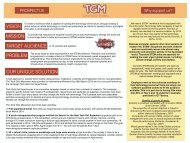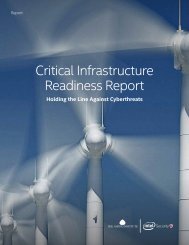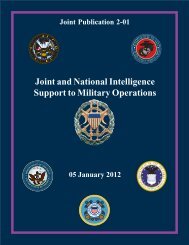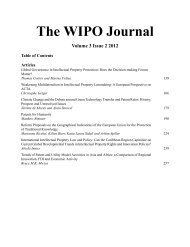Transparency Initiative (EITI)
2eoch1l
2eoch1l
You also want an ePaper? Increase the reach of your titles
YUMPU automatically turns print PDFs into web optimized ePapers that Google loves.
10 Executive summary<br />
15. High(er) expectations of future impacts: Over 80% of<br />
stakeholders see a positive contribution to all result areas<br />
under review of this study (fiscal transparency, public<br />
debate, anti-corruption, trade and investment climate).<br />
For the future, stakeholders’ expect the <strong>EITI</strong> to highly<br />
contribute to ‘efficient use of revenues’, where expectations<br />
show a 32% increase from 20% (today) to 52% (future).<br />
The areas of ‘better management of ecological effects’,<br />
‘better management of social tensions’, ‘fiscal<br />
transparency’ and ‘Ease of Doing Business’ are all above<br />
a 20% increase.<br />
16. ‘Net Foreign Direct Investment (FDI) inflow’ and the<br />
‘time to prepare and pay taxes’: Macro-data analysis of<br />
<strong>EITI</strong> countries in a panel of 98 countries suggests that<br />
the <strong>EITI</strong> could have a positive effect on two variables<br />
tested by this study: ‘Net Foreign Direct Investment<br />
(FDI) inflow’ and the ‘time to prepare and pay taxes’.<br />
17. Less impact on both ends of the development<br />
spectrum: In free and democratic as well as in nonfree<br />
and autocratic countries people experience less<br />
impact from the <strong>EITI</strong>. The prospects for impact appear<br />
to be highest for the countries in-between: hybrid<br />
countries tend to be rather weak in many dimensions<br />
of statehood and a certain capacity level of stakeholders<br />
(e.g. ability to produce timely and meaningful reports,<br />
constituencies to understand this data along with<br />
political rights to express their informed political<br />
will, consensus-building, effective use of support,<br />
policy learning) needs to meet a trajectory of general<br />
political and economic transformation. Therefore,<br />
implementing the <strong>EITI</strong> causes more of a change in<br />
these hybrid countries in transformation compared to<br />
stable democracies and autocracies.<br />
18. Countries can delink increased transparency from increased<br />
accountability: In order to safeguard civil society<br />
participation in the <strong>EITI</strong>, the Civil Society Protocol<br />
was developed by the Board and made part of the<br />
Standard in 2015. However, the study could not identify<br />
robust methodology in the Validation process as established<br />
in 2016 that would consistently detect whether<br />
there is freedom to debate the outputs of the <strong>EITI</strong>. In<br />
the validation reports of the past, there has been very<br />
little consideration of this, despite it being a part of the<br />
2011 Rules. The “custodians” of the Standard, the <strong>EITI</strong><br />
Board and International Secretariat, can only guarantee<br />
the production and assurance of the Requirements under<br />
the <strong>EITI</strong> Standard, which is done through the Validation<br />
process. Unless the Board integrates items into<br />
the standardized <strong>EITI</strong> methodology and/or the Secretariat<br />
includes those in the guidance notes which interpret<br />
the Requirements, countries can dodge the debate<br />
and political consequences, and in doing so they are<br />
able to delink increased transparency from increased<br />
accountability.<br />
19. No overarching ‘transparency and accountability metrics’:<br />
Given the broad range of objectives and institutional<br />
solutions observed, this study found it feasible to<br />
produce a generic results model, but not feasible to develop<br />
a single overarching indicator for <strong>EITI</strong>-induced<br />
systemic sector development or ‘transparency and accountability<br />
metrics’ that cover the diverse set of 50<br />
plus country cases. The <strong>EITI</strong> is implemented by countries<br />
and indicators measuring impact need to fit to the<br />
individual country case of systemic strengthening of<br />
good governance. The theory of change and the generic<br />
<strong>EITI</strong> results model of the study is designed to cover this<br />
demand-driven and flexible approach.<br />
EFFICIENCY<br />
20. Research into its own impact neglected: None of the officially<br />
mandated evaluations and reviews has served<br />
the purpose of producing longitudinal baseline data. In<br />
that respect, the <strong>EITI</strong> has not used its resources meaningfully<br />
to conduct research into its own impact.<br />
21. Accountability of remunerations: Country case studies<br />
indicate that remunerations for <strong>EITI</strong> activities and per<br />
diems in lesser developed countries can be out of balance<br />
with poverty or income levels in those countries.<br />
SUSTAINABILITY<br />
22. Consensus to make transparency meaningful for the<br />
target groups: The <strong>EITI</strong> is unified in the approach to<br />
make transparency meaningful for the target groups<br />
(e.g. Progress Report 2016 – From Reports to Results). It<br />
has been widely ascertained by stakeholders that more<br />
of the same (publishing reports that remain largely unread<br />
by the target audience in some countries) does not<br />
lead to better results and can at a certain point be an<br />
impediment to impact and sustainability.









